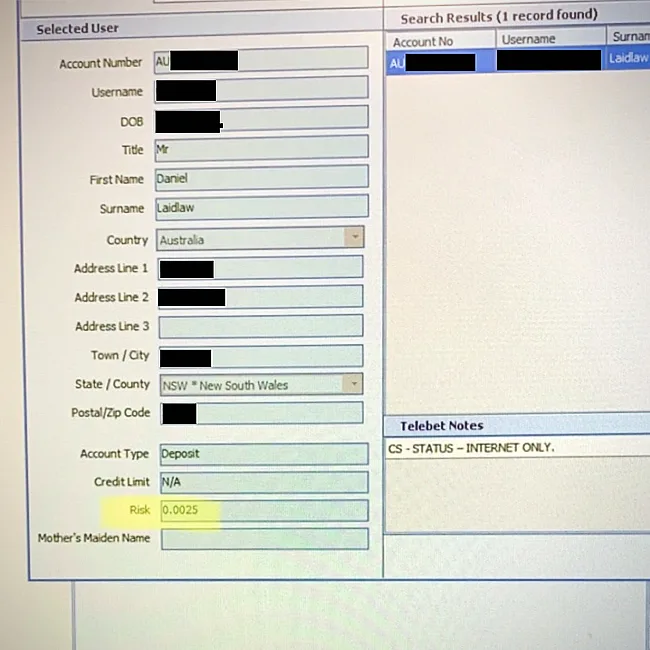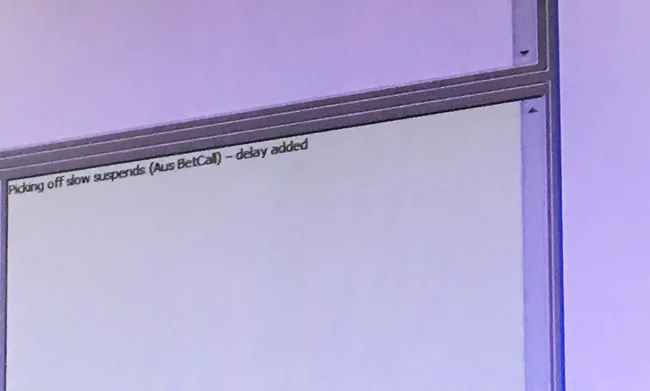Bet365 - Whistleblower Reveals ALL
Previously we have looked inside a bookmakers trading desk. There are a lot of similarities between that and the story of a whistleblower which came to light about Bet365.
I have reproduced the key contents below. It seems Bet365 have a wide range of measures to identify ‘problem gambling’, where ‘problem’ means they don’t make money from the punter. As you should know by now, if you win they lose. So making sure you don’t win is the number one priority for large corporate bookmakers.

‘You can't win. Those that win are stopped. Those that lose are exploited …’
Whitsle blower gives the inside edge
An insider working for the big bookmaker Bet365 in Australia, was so shocked at what they were doing behind the scenes. He wanted to expose their secrets as it was a ‘burden on his conscience’.
He revealed how they used off the record algorithms to restrict successful punters and add a delay to those who gambled in-play. And why do this you ask? Well, this was they secure themselves a healthy profit at the expense of their customers. They were ensuring that customers couldn’t win in the long term.
Who are their valuable customers?
As mentioned in the mini-series, bookmakers have their ‘valuable’ customers. It seems like Bet365 categorises the opposite as the ‘Priority Problem customer’ and a punter named Daniel Laidlaw fell victim to this ‘problem customer’ policy.
“When I tried to place my usual-sized bets, it was apparent that I could only bet to win an amount in the range of $5-10 when previously, I’d be able to bet to win amounts between $1,000 and $5,000.” - Daniel Laidlaw

So how does the algorithm work?
First off your data is analysed: –
- What sports do you choose?
- How much money on average do you spend?
- How many bets have you placed?
But most importantly the algorithm looks at your total turnover and how this relates to your win or loss ratio!
So if it thinks you are a constant big winner the algorithm kicks in and stops you from being able to bet any significant amount of money. When Mr Laidlow tried to confront them about obtaining his risk rating he was unsuccessful.
“I think it’s outrageous…unfair… there’s also just no transparency. If they’re profiling us in this way, then we should know as customers exactly what it means and have access to this information” - Daniel Laidlaw
For every winner the algorithm finds, it also finds a loser…
When a punter begins losing significantly and often the algorithm will jump on that. It then helps you open up to more losses, now the losing punter is tempted with free bet offers and can gamble with bigger amounts. When I was behind the bookmaker’s desk these losers were given the VIP treatment as their hefty contribution’s to the bookmaker’s profit made them a valuable customer and we had to respect that!
Bet365 claimed they had a ‘robust responsible gambling policy in place to monitor each customer’s gambling patterns and expenditure and ensure that their gambling behaviour is within responsible limits.” It seems the algorithm was created to only monitor safe and fun gambling…
Will you be banned or restricted by Bet365

“I think it’s outrageous…unfair… there’s also just no transparency. If they’re profiling us in this way, then we should know as customers exactly what it means and have access to this information” - Daniel Laidlaw
This whistleblower is specifically talking about Australian markets. Pre match markets are similar to that which you see elsewhere in the world. But unlike in the UK, where online bookmakers allow you to bet in-play online, Australian laws dating from 2001 only allow in-play betting via the phone in an attempt to minimise losses from online betting. But the restrictions you face if you beat Bet365, are the same.
It seems that another policy document from September 2016 states that phones allow an ‘advantage‘ to punters on fast-paced dynamic sports, like tennis or cricket.
“The nature of betting on the telephone as opposed to betting online lends itself to the possibility of being exploited in fast-changing markets … some customers are aware of this fact and use the pace of the sport to their advantage when placing bets.”

‘Delay testing’ – the manipulative tool to stop winners
It seems perfectly natural to capture the bad guy before he does wrong again, so of course, finding ways to do this by stopping high-profit winners are in the foremind of the bookmaker.
Bet365 has used a strategy called ‘Quick Code Delay Testing’, tracking the length of punters calls and whether there were any delays once placing a bet.
Lawyers working for the company claimed the test was designed to minimise “naturally occurring” delays experienced by customers when placing bets over the phone. However, the informer has suspicions this is for something else…
He believes they are testing to see if people would notice a delay, claiming that some sports had a 1-3 second delay when a bet was submitted to when it was accepted. Obviously, every second counts when betting in-play and manipulating delays into the process can stump a punter at their game as the bookmaker can decide to reject or adjust the odds.
Bet365 did make a statement saying “it has never used any form of delay in its telephone in-play betting service in Australia,” and that its “telephone system does not have any such functionality”. – but it does make you think…

Is Bet365 cheating?
“Essentially, it’s a contractual matter between a client and a sports bookmaker. That’s the same as if I go into a shop and the shopkeeper decides they don’t want to serve me. They can decide not to do that.”
Alastair Shields, chair of the NT Racing Commission
It seems that these gambling commissions are keeping an eye on these matters and that the ins and outs of how the bookmakers keep and make their money at the expense of the punter are always a controversial subject. That is why stories like the informer at Bet365 in Australia, emphasise that there is a lack of knowledge on what happens behind the scenes to the everyday gambler.
It should be known that punters are not getting the fair game they believe they are. Winners are considered a ‘problem customer’, punters should know when they place a bet they should do so knowing the full extent of the bookmaker’s agenda and how they specifically come into their equation.
As I discovered many years ago and I’m sure many others will, trying to win against a bookmaker is extremely hard. That’s even harder when you are not playing a fair game.
However, if you use a betting exchange then you are not up against these tricks, its just your opinion against others. If you are better you win, it’s as simple as that.